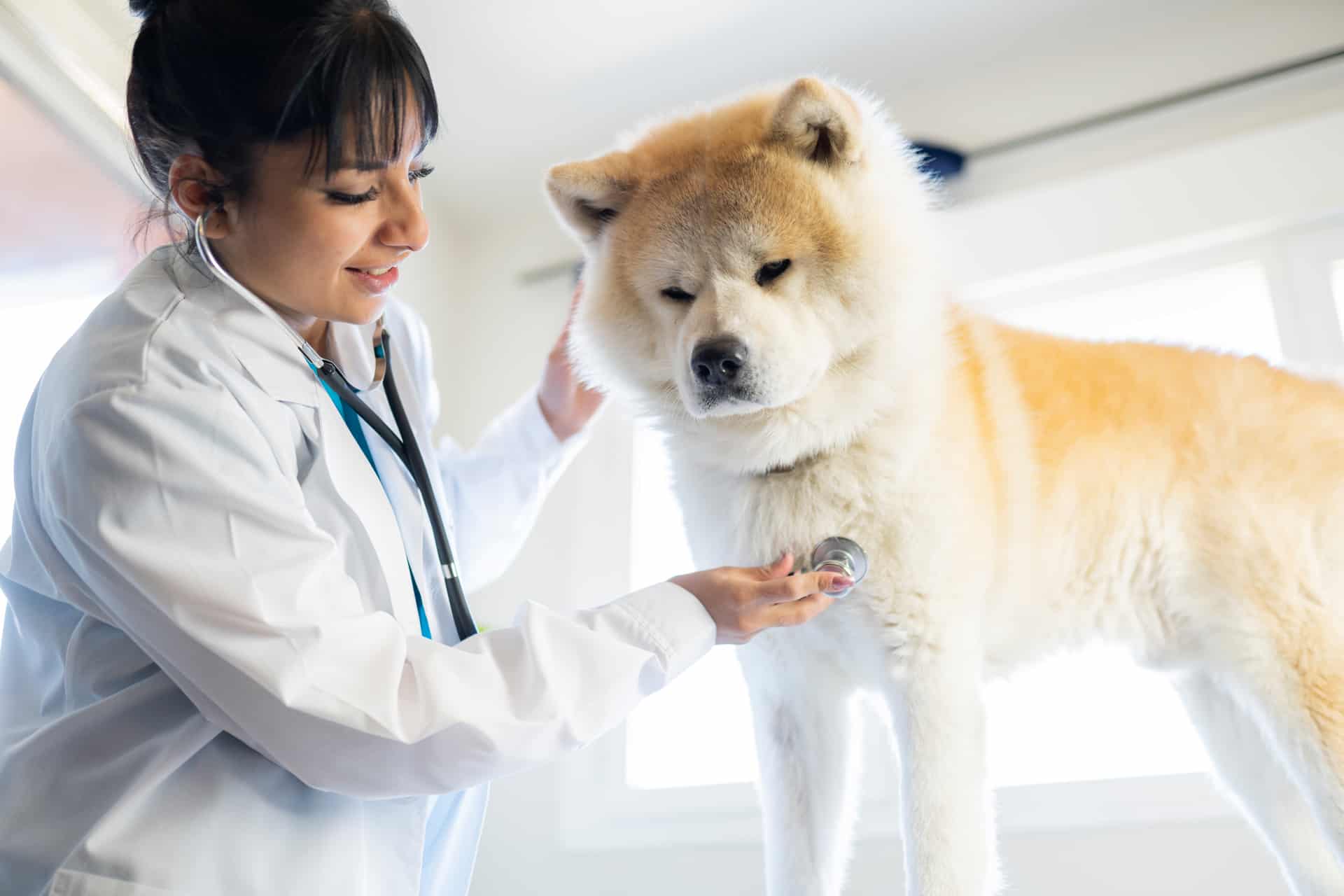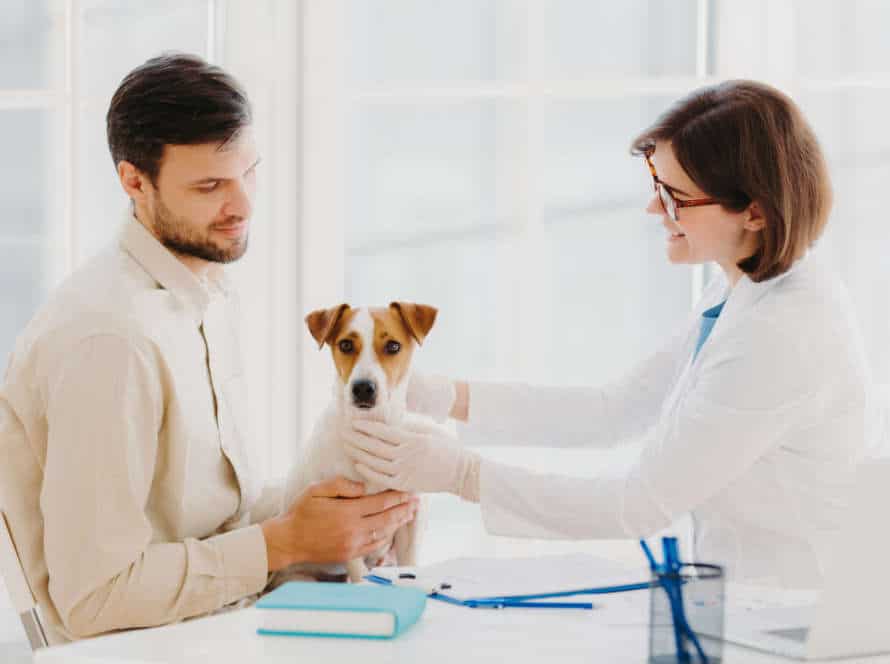Preventive Health Care Tips for Your Dog
Maximizing your pup’s health is key for a long, content life. Here are some hints to bear in mind:
- Vet Visits: Schedule routine visits with your vet to monitor your dog’s wellbeing and spot any health issues quickly.
- Vaccinations: Keep vaccinations up-to-date to defend them from infectious diseases.
- Grooming: Regularly brush fur, trim nails, and clean teeth to protect against health issues.
- Exercise: Exercise helps keep them healthy and happy. Plus, it maintains a healthy weight and strengthens joints.
- Healthy Diet: Give a balanced diet for optimal weight and essential nutrients.
By following these tips and giving your dog lots of love and attention, you can help ensure a joyful and healthy life!
Nutrition and Feeding
Nutrition for your furry pal is a must for staying healthy. Giving your pup the right food will help him stay strong and boost his immune system. Also, it can cut down the risk of obesity. It’s important to serve the proper amount of the correct food and make sure he’s getting the essential nutrients. Let’s dive deeper into the nutrition and feeding plans to keep your pup in great shape!
Importance of a balanced diet
A balanced diet is key to a dog’s health and well-being. It makes sure that the pup’s nutritional needs are met. This helps prevent disease, obesity, and other health issues.
As a pet owner, you should feed your furry friend a balanced diet. This should include protein, carbs, fat, vitamins, and minerals. Overfeeding, or giving them food too high in fat or carbs, can lead to obesity and other health problems like diabetes, heart disease, and joint pain.
A vet can tell you the right type and amount of food for your pup’s breed, age, and activity level. Also, you can give treats and snacks that are high in protein and low in fat.
Giving a balanced diet to your pup can increase their lifespan, improve their quality of life, and reduce the chance of health issues.
Choosing the right type of food
Choosing the right food for your pup is key for preventive health care. With so many options, it can be overwhelming. Here’s how to choose the best food:
- Look for whole food ingredients – real meat, veggies and fruits.
- Check the nutrition value. Get the right balance of protein, fats, carbs, vitamins and minerals.
- Think about your pup’s age, breed and activity level. Different ages have different needs.
- Consider your pup’s health history. Check with your vet if your pup has any health conditions that need special food.
Pro Tip: Invest time in researching and selecting the right food. It can lead to a healthier and happier life for your pup!
Managing portion sizes
Managing portion sizes is essential for your pup’s good nutrition and health. Doing so can prevent overeating, obesity, and other health issues. Here are some tips to help you out:
- Ask your vet about your dog’s ideal weight and daily calorie intake.
- Use a measuring cup or scale to get the right amount of food.
- Don’t let your dog free-feed; create a feeding schedule.
- Keep an eye on your pup’s body condition and adjust portion sizes accordingly.
- Give low-calorie treats or use a portion of their regular food as training rewards to avoid overfeeding.
By following these steps, you can help ensure your furry friend has a healthy lifestyle.
Exercise and Activity
Exercise and activity are essential for your pup’s health and happiness! It can help with weight management, reduce heart and lung diseases, and release extra energy. This can lead to better behavior.
Let’s talk about how to best promote your dog’s health through exercise and activity.
Benefits of regular exercise
Regular exercise is a must for keeping your health and happiness in check–not just for us humans, but for our furry pals, too! Here are a few advantages of exercising with Fido:
- Weight Control: Working out helps dogs burn extra calories and keep a healthy weight, lowering their danger of obesity and other health problems.
- Energy Outlet: Exercise provides an opportunity to release pent-up energy, and can reduce behavioral issues.
- Digestive Health: Working out keeps a pup’s digestive system in tip-top shape, preventing constipation and diarrhea.
- Immune System Strength: Regular exercise can help strengthen a pooch’s immune system, making them more resistant to infections and diseases.
- Mental Stimulation: Exercise also keeps them mentally stimulated and helps with their cognitive growth and well-being.
Remember to adjust your pup’s routine to their age, breed, and health status and always talk to your vet before beginning a new exercise plan.
Pro Tip: Dedicate a chunk of your day to taking your pup for a walk or playing with them, and switch it up to keep things interesting!
Recommended exercise for different dog breeds
Different dog breeds have varying exercise needs, depending on their energy levels, size, and temperament. Exercise is a must for your pup’s physical and mental health. Here are some suggested exercises for different breeds:
- Active breeds such as Australian Shepherds, Border Collies, and Jack Russell Terriers need at least 2 hours of activity a day. This includes frisbee, agility training, and long walks.
- Retrievers, Boxers, and Bulldogs love being outdoors and playing fetch. They need a minimum of an hour of exercise to burn off their energy. This can be achieved through running around the park, in the backyard, or taking long walks.
- Toy breeds like Chihuahuas and Pomeranians have smaller bodies and shorter legs, so they require less exercise. Short walks, indoor playtime, and interactive toys are ideal for these breeds.
- Senior dogs need gentle exercises like slow walks and gentle playtime to keep them healthy and prevent joint problems.
These exercises help keep your dog fit, healthy, and maintain a healthy weight. It’s important to tailor their exercise routine to their age and breed.
Ways to keep your dog active indoors
Take care of your pup indoors! It’s essential for their physical and mental health, particularly in bad weather or during lockdowns. Here’s how you can keep them entertained and active:
- Hide and seek with their favorite toys or treats.
- Challenge their minds with puzzle toys and treat-dispensing balls.
- Create an indoor obstacle course with chairs, cushions, and other household items.
- Have a dance party! Play upbeat tunes and join in the fun.
- Train them – it’s great for mental and physical stimulation.
But always make sure your pup’s safety is a priority. With these tips, you can easily keep your fur-friend fit and content while staying inside.
Vaccinations and Parasite Prevention
Securing your pup from ailment and parasites is vital for pet-owners. Vaccinations and parasite prevention are two key methods to guarantee your dog’s wellbeing and contentment. In this article, let’s analyze the different kinds of vaccinations and the steps you can take for parasite prevention for your pup.
Importance of vaccinations
Vaccinations are necessary to stop infectious diseases in dogs and control contagious illnesses in the community. Vaccines cause the dog’s immune system to identify and battle bad pathogens.
Here are the reasons why vaccinations are significant for dogs:
- Stop deadly diseases: Vaccines can shield dogs from fatal illnesses like rabies, distemper, parvovirus, and hepatitis.
- Assure long-term health: Vaccines help build immunity and reduce the possibility of chronic illnesses like heart disease and cancer.
- Save funds: Preventive vaccination is much cheaper than treating a sick dog. Quality healthcare for your pooch can be costly.
- Protect other creatures and humans: Some infections can be passed on to other animals or even people, making vaccination a public health matter.
Routine vet checkups and suitable vaccinations can help stop unexpected issues and make sure your dog is happy and healthy all year round.
Common canine parasites and their prevention
Pups are prone to different parasites which can cause them harm. Usual canine parasites that owners should be aware of are ticks, fleas, heartworms, and intestinal worms.
Vaccinations and parasite prevention are essential for keeping your pup healthy. So, here are some preventive health care tips for your pooch:
- Vaccinations: Vaccinate your pet with core canine diseases like parvovirus, distemper, and rabies.
- Parasite control: Inspect your pet for ticks and fleas and use tick and flea prevention products recommended by your vet. Also, prevent heartworm and intestinal parasites with proper medication and treatment.
- Cleanliness and hygiene: Keep your pup’s bedding and environment clean. Discard poop properly to stop parasites from spreading.
Pro Tip: Regular vet visits detect and treat any parasitic infections quickly, helping keep your furry pal in tip-top shape.
Preventive measures for tick and flea infestations
Protect your pup from ticks and fleas with vaccinations, parasite prevention, and regular vet visits.
Vaccines for Lyme, Ehrlichiosis, and Anaplasmosis can help defend against tick-borne illnesses.
Flea and tick preventives like collars, sprays, shampoos, and topical treatments are available. Speak to your vet to decide which one is best for your pup’s lifestyle and health.
Check-ups with the vet can detect infestations and suggest other preventive steps.
By taking these preventative measures, you can secure your dog from sickness, reduce the spread of diseases, and avoid expensive, lengthy treatments later.
Dental Care
Give your doggo proper dental care! It’s important. Brushing their teeth can help prevent plaque build-up which can lead to periodontal disease. Start brushing early and make it part of their daily routine.
Here are some tips for their dental care:
Importance of dental hygiene
Looking after your pup’s dental hygiene is key for their health and wellbeing. Just like us, if a dog’s teeth aren’t taken care of, they can suffer from gum disease, bad breath and tooth decay. To make sure your furry friend has a healthy mouth, try these tips:
- Brush their teeth regularly with a doggy toothbrush and toothpaste.
- Dental chews and treats are great for removing plaque and tartar.
- Give them dental toys to chew and clean their teeth.
- Regular check-ups with the vet will help catch any dental issues early and stop them from getting worse.
Pro Tip: Taking care of your pup’s pearly whites not only prevents dental problems, it also makes them healthier and lengthens their life.
Brushing your dog’s teeth
Maintain your doggo’s dental hygiene and overall health with consistent teeth brushing! Much like humans, pooches can experience tooth decay, gum disease, and bad breath.
Here’s how to brush your pup’s teeth:
- Choose a toothbrush and toothpaste specifically for dogs.
- Give your pet a small amount of toothpaste to get used to the flavor.
- Gently brush their teeth and gums in a circular motion after lifting their lip.
- Be patient and take it slow, gradually increasing the time spent brushing their teeth.
- Keep up the brushing routine, and your furry friend will have healthy teeth!
Pro tip: If your pup is being stubborn, try using dental treats, chews, or toys instead.
Alternative dental hygiene products for dogs
Dental hygiene’s just as essential for our four-legged buddies, so there’s a few alternatives on the market. Like:
- Dental chews – to scrape plaque & tartar off teeth while keeping pup amused.
- Raw bones – great way to clean teeth & freshen breath. But supervise your dog.
- Coconut oil – antibacterial properties that reduce plaque & boost healthy gums. Add a teaspoon of oil to food or rub it on teeth & gums.
- Herbal toothpaste – natural ingredients for healthy teeth & gums. Just use a toothbrush or finger brush.
- Probiotics – great for gut health, bad breath & healthy teeth & gums. Add a supplement to food or give probiotic treats.
Mental Health and Stimulation
Mental stimulation is important for a pup’s health, just like physical exercise. Keeping their minds sharp with activities that have a start, middle, and end are great for enrichment. These will help keep them mentally healthy and content. Here are some steps to help you do this:
- Begin with basic training exercises – Starting with simple commands that they already know and building up to more challenging tricks can be a great way to engage your pup’s brain.
- Introduce them to interactive toys and puzzles – There are many toys and puzzles available that are designed to challenge your pup’s brain and reward them for solving them. These can be a great way to stimulate their minds.
- Teach them new tricks – Teaching your pup new tricks not only helps to stimulate their minds but also strengthens your bond with them.
- Experiment with new scents and textures – Pups have a keen sense of smell and can benefit from exposure to new scents and textures. You can hide treats around the house for them to find or take them on a walk to explore different smells and textures.
- Give them plenty of playtime and socialization – Pups benefit from interacting with other dogs and people. Playtime and socialization can help keep them mentally healthy and provide them with the opportunity to learn and explore in a safe environment.
Signs of anxiety and depression in dogs
Anxiety and depression aren’t just in humans – they can affect dogs too! Here are signs to look for in your pup:
Anxiety:
- Excessive barking/whining
- Pacing & restlessness
- Shaking/trembling
- Destructive behavior (chewing furniture, digging)
- Loss of appetite
- Aggressive towards people/pets
Depression:
- No interest in toys/activities
- Decreased appetite/weight loss
- Sleeping more than usual
- Hiding/avoiding contact
- Inactive/lethargic
- No enthusiasm/tail wagging
If you see any of these signs, chat with your vet & hire a professional dog trainer. Prevention is key to keeping your pet happy & healthy!
Activities to stimulate mental health
For your furry buddy’s mental health, try these activities to keep their minds sharp and healthy!
- Teach them new tricks! This aids problem-solving skills.
- Play hide-and-seek with treats or toys around the house or yard. It uses their sense of smell.
- Take different walking routes. Mix it up and let them explore.
- Get interactive toys like puzzle feeders or treat-dispensing toys.
- Social interaction. Dogs love interacting with other dogs and humans.
It is important to give your dog stimulation. Experiences are key to mental fitness. So, have fun with your pooch!
Training and obedience as mental stimulation
Training & obedience are more than just tools to teach your pup proper behavior. They are also a key form of mental stimulation, which helps with preventive health care. Here’s how:
- Mental stimulation – Learning new commands and tricks keeps your pup mentally active and challenged, decreasing the risk of mental decline or cognitive issues as they age.
- Stress relief – Training & obedience can provide structure and routine, decreasing anxiety and relieving stress.
- Better behavior – Regular training & obedience can improve your pup’s behavior, preventing them from doing dangerous, destructive, or unpleasant activities.
- Bonding – Training & obedience help you two create a stronger bond, increasing trust and communication.
Frequently Asked Questions
Q: How often should I take my dog to the vet for preventive care?
A: It is recommended to have your dog seen by a veterinarian once a year for a check-up and vaccinations. However, senior dogs, dogs with chronic conditions, or those on medication may need more frequent visits.
Q: What are the most important preventive measures I can take for my dog?
A: A healthy diet, regular exercise, proper grooming, and parasite prevention are all vital to your dog’s health. Additionally, keeping up with vaccinations and routine check-ups will help catch any potential health issues early on.
Q: How can I help prevent dental problems in my dog?
A: Brushing your dog’s teeth regularly and providing dental chews or toys can help prevent tartar and plaque buildup. It is also important to have your veterinarian perform regular dental cleanings to remove any buildup that cannot be prevented through at-home care.
Q: Is it important to spay or neuter my dog?
A: Yes, spaying or neutering your dog not only helps prevent unwanted litters, but it can also have health benefits such as reducing the risk of certain types of cancer and behavioral issues.
Q: What kind of parasite prevention should I use for my dog?
A: Your veterinarian can recommend the best parasite preventatives for your dog based on their lifestyle and risk factors. This may include monthly flea and tick preventatives and regular deworming medications.
Q: Can I provide preventive care for my dog at home?
A: Yes, there are many things you can do at home to help keep your dog healthy, such as providing a balanced diet, regular exercise, and proper grooming. However, regular visits to the veterinarian are still necessary for check-ups and preventative treatments.







